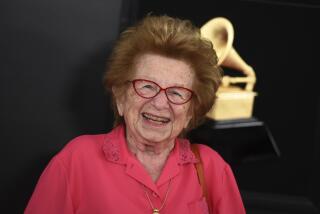‘Quiz Kid’ star Ruth Feldman dies at 80
- Share via
By the time Ruth Duskin Feldman was 5 she was reading her father’s chemistry books and within two years she was writing poetry.
Her prodigious talents soon launched her on a nearly 10-year “career” on the nationally syndicated radio program and subsequent TV show “Quiz Kids,” which ran from 1940 until 1953 and gained a wide and steady audience.
------------
FOR THE RECORD
June 15, 1:59 p.m.: The headline on an earlier version of this article said that Ruth Duskin Feldman died at the age of 88. As the article noted, she was 80.
------------
But Feldman separated herself from her past notoriety for decades before eventually writing the book “Whatever Happen to the Quiz Kids? Perils and Profits of Growing Up Gifted,” a sobering look at gifted children as they age.
Feldman died May 18 in Ontario of heart failures while on a trip to California to visit relatives, her daughters said. She was 80.
The premise of “Quiz Kids” was to present questions to a panel of gifted children, chosen for their IQs, academic interests, poise, quickness and sense of humor. For her first few years on the program, Feldman didn’t realize what a big deal it was, thinking she was only being seen by a small studio audience — a perception her parents were happy to perpetuate, family members said.
“Her father was wary of what becoming a celebrity could do to a child and didn’t want her getting what he called a ‘swelled head,’ ” said her daughter Heidi. “But with the overwhelming success of the program, she eventually caught on.”
There were magazine stories, newspaper articles and mountains of fan mail. People on the street would recognize her and then there was the cross-country promotional train tour during World War II, where audience members had to buy a war bond to get a ticket. She met celebrities like Bing Crosby, Bob Hope, Judy Garland and Chico Marx.
“We were on the train tour together and passed the time playing word games,” recalled Richard Williams, a fellow “Quiz Kid” who was a participant on the program with Feldman. “Ruth was very good with words. Her strength was anything involving literature.”
Her book received national attention. Feldman updated the book in 2000 and was in the process of revising it at the time of her death.
Born Ruth Duskin in Chicago on June 13, 1934, Feldman published her first book, “Chemi the Magician” when she was 13 to help her younger sister with chemistry. She won a scholarship to the Chicago Lab School as a teenager and decided to wind down her involvement in “Quiz Kids” because of school. She had appeared on more than 150 shows, before leaving the program soon after turning 16.
“She wanted a more normal life, besides which, she loved being in school,” said her daughter Heidi.
While a student at Northwestern University, she was a panelist on three radio programs and TV shows, “College Quiz Show,” “Super Ghost” and “It’s About Time.” During her sophomore year, she was chosen in a nationwide search as guest editor for Mademoiselle’s 1952 college board issue.
In 1953, she married Gilbert Feldman and together they had three children. When they were grown, she began a career as a writer, editor and lecturer.
“She was a wonderful wordsmith,” said longtime colleague Miriam Jerris, rabbi of the Michigan-based Society for Humanistic Judaism. “Whenever we were brainstorming, she could talk through ideas and make cohesive overall statements that brought together our varied and disparate ideas to make sense of it all.”
Feldman co-authored four college textbooks on human and child development and was a regular lecturer at universities
“She simply, quietly succeeded in every endeavor that was interesting and important to her,” her daughter Laurie said. “Far from elevating her own achievements, she enabled everyone around her to find their areas of passion and fulfill them.”
In addition to her daughters HeidI and Laurie, Feldman is survived by a son, Steven; a sister, Bunny Shuch; and eight grandchildren.
Joan Giangrasse Kates writes for the Chicago Tribune.
More to Read
Start your day right
Sign up for Essential California for the L.A. Times biggest news, features and recommendations in your inbox six days a week.
You may occasionally receive promotional content from the Los Angeles Times.





